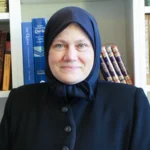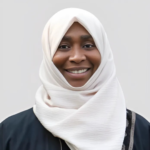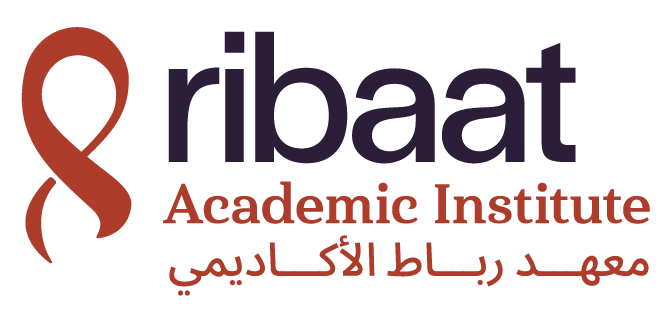Islamic Studies
For Women, By Women
At Ribaat Academic Institute, our Islamic Studies program is designed to nurture and empower Muslim women through a structured curriculum that balances deep scholarship with practical application. Taught by qualified female scholars, our comprehensive courses guide students through the foundational and advanced fields of Islamic knowledge, providing a rich and well-rounded education that aligns with traditional Islamic scholarship. Understanding the Muslim woman’s needs, the Ribaat program aims to make learning flexible, affordable, and accessible.
Our Approach
Rooted in authenticity and guided by a commitment to excellence, the Islamic Studies program bridges traditional Islamic scholarship with the realities of the modern world. We prioritize an environment where questions are welcomed, diverse perspectives are shared, and spiritual and academic development is balanced.
Ribaat Academic Institute strives to equip women not only with knowledge but with the tools and confidence needed to be leaders, educators, and active contributors to their communities, embodying the teachings of Islam in daily life.
The aim of the program is to graduate scholars and teachers prepared to educate others, as well as to provide independent classes for those not seeking certification.
The Ribaat Difference
Weekly Live Classes
Instruction in English
Zoom Sessions with Camera on
Recordings Available
Women, ages 17 & up
Meet Ribaat Students
Academic Year
Fall Term
September through December
Registration Opens August 15
Spring Term
January through May
Registration Opens December 15
Summer Term
June through August
Registration Opens May 15
The Ribaat curriculum consists of 13 tracks.
Each track covers 4 levels of study in one domain of knowledge. At least one course is offered in each level of every track. Some courses are covered in one term, while others are divided into two or more parts.
The 13 tracks are Aqida, Fiqh, Hadith, Sira, Tafsir, Communication, Education, History, Purification, Social Sciences, Certification Requirements, Arabic, and Tajwid.
Aqida is the foundational study of creed and covers the six pillars of faith: God, the angels, the revealed books, the messengers, the Final Day, and divine destiny.
Hadith is the study of the sunnah, behavior, words, and deeds of the Prophet Muhammad ﷺ. Upper-level courses go into the history of the compilation of hadith, narration, classification, and transmission.
The Ribaat Arabic Program provides a comprehensive curriculum for non-Arabic speakers designed to develop students’ reading, writing, speaking, and listening skills in the Arabic language.
Ribaat certification requirements are required courses for students who are seeking certification. They include orientation courses, seminars, oral assessments, thesis projects, and discussion, as well as in-person retreats to ensure a solid, well-rounded understanding of the concepts learned and an ability to apply them practically.
Communication is the study of how to effectively write, speak, and deliver a message. Communication studies provide students with the necessary skills to be effective teachers, community leaders, and changemakers.
Education courses ground students in pedagogical theory, modern educational methodology, and best teaching practices. They also provide the developmental knowledge needed to connect with students at each age and a background of some of the issues that may be faced when working with them.
Fiqh is the study of codified Islamic law (jurisprudence) according to a specific madhhab. The study of fiqh is divided into two primary subject areas: the fiqh of worship and the fiqh of deeds. The fiqh of worship includes matters of purity, prayer, fasting, pilgrimage, and mandatory charity (zakat). The fiqh of deeds includes social, political, and economic matters of life.
History is the study of past events of the earth, its peoples, civilizations, natural resources, and international relations. Ribaat history courses focus primarily on the history of the Muslim world and the diaspora, Muslim historical figures and movements, as well as the effect of global history on Muslim civilizations.
Tazkiya is the study of how to purify the self. It includes the qualities of a believer, qualities of a disbeliever, and methods of identifying and treating diseases of the heart. Tazkiya teaches spiritual ethics and how to gain piety while living in the world in the manner of those who were and are beloved to God.
Sira began as the documentation of the battles during the time of the Prophet Muhammad ﷺ and grew into a complex compendium of his entire lived history. His life, relationships, manners, experiences, what he did and did not do, what he said – all add up to Sira. His life is a blessed example of a lived Quran and how best to live on this earth.
Social Sciences at Ribaat encompass the study of social and cultural aspects of human relationships both individually and collectively within Muslim societies. This includes the study of Islamic cultures and societies through the lenses of anthropology, sociology, historiography, human geography, education, history, communications, and psychology.
Tafsir is the exegesis of the Quran. It includes asbab al-nuzul, or the contextual reasons for the revelation of particular verses; grammatical points; an explanation of vocabulary; related hadiths or stories from the life of the Prophet ﷺ; commentary and lessons learned. Tafsir can be as simple as a translation of the Quran, since a translator interprets the meaning and renders it into English.
Tajwid is a Quranic science that details the correct pronunciation of the letters of the Holy Quran, including points of articulation, the attributes of letters, the duration of letters, and mouth shape and letter fulfillment, as well as the rules of tajwid. Ribaat tajwid courses enable students to become proficient in the recitation of the Holy Quran, with a complete understanding of and ability to apply the rules of tajwid.
Student Testimonials
Upcoming Dates
Dec. 15 | Registration Opens
Jan. 20 – May 11 | Spring Term Dates
Jan. 11 – Feb. 21 | Arabic Module 1
Feb. 9 – Apr. 9 | Arabic Module 2 Registration
Apr. 5 – May 16 | Arabic Module 2
Meet our scholars









FAQ
General
Ribaat is an online academic program that offers courses in Islamic Studies, Arabic Language, and Tajwīd of the Holy Quran to women around the world.
The program provides Muslim women with a solid foundation through a comprehensive curriculum covering the full range of traditional Islamic Studies.
The aim of the progam is to graduate scholars and da’iyas prepared to educate others, as well as to provide independent classes for those not seeking certification.
Students are women 17 years and up. They are professionals (lawyers, doctors, teacher, etc.), university students (bachelors, masters, PhD, MD, etc.), stay at home moms, grand-mothers, Islamic school teachers, business owners, and more.
Ribaat students are from all walks of life and reside in over 90 countries.
The academic year is composed of three terms.
Fall Term | September – December
Spring Term | January – May
Summer Term | June – August
The program is flexible to fit the needs and schedule of each individual student.
Courses are online, each about 14 weeks long, and meet live once a week for Islamic Studies courses, two times a week for the Arabic program and up to three times for Tajwid halaqa sessions.
Yes, and they can be written and practical activities.
Level 1 courses require less time commitment. The higher the level, the more time it will take. The homework is designed to help you reflect on and apply your learning.
Ribaat Tajwid Program enables students to become proficient in recitation of the Holy Quran, with complete understanding and application of the rules of Tajwid. The program takes students from the beginner level to fluency in recitation, and from there onto a journey of memorization.
The Ribaat Academic Program is comprised of 13 tracks. Each track covers 4 levels of study in one domain of knowledge. At least one course is offered in each level of every track. Some courses are covered in one term, while others are divided into two or more parts.
- Tafsir
- Sira
- Aqida
- Fiqh
- Tajwid
- Arabic
- Hadith
- History
- Education
- Purification
- Social Science
- Communication
SIR 101 | Companions of the Prophet ﷺ
PUR 101 | Training the Tongue, Purifying the Heart
AQD 101 | Foundations, Flounderings & Faith
FQH 101 | Fast & Friendly Fiqh: An Introduction to Worship Essentials
TAF 101 | Reflections from the Quran
Classes are held live online and recordings are posted on the student portal.
Simply start taking classes!
Email advising@rabata.org to discuss the requirements and joining a cohort.
Yes, please go to Enrollment > Financial Aid to find out more and to apply.
The Ribaat Academic Institute’s Arabic Program develops reading, writing, and speaking the classical Arabic language in students, with the primary focus to access and understand Islamic sacred texts. It is designed with first-time learners in mind, whilst students from all backgrounds and levels are welcome to join. To learn more, go to Academics >> Arabic.
You can ask questions during live classes. Every class also has a Whatsapp thread where students can talk with each other, the course admin, and the course instructor.
You can take a placement test to register for an Arabic course by visiting rabata.info/arabicplacement
Regular registration students will have full access to the course forum, including access to submit coursework. If work is completed successfully, regular registration can receive credit for a for-credit class.
Auditing students will have full access to live sessions and recordings, but will not have to submit any work. Therefore, auditing students will not receive credit toward any certification for an audited course.
The Academic Program
The Ribaat program is open to Muslim women over age 17.
A student may complete the courses at her own pace, whether that be one course per term or more. We advise new students to enroll in no more than 2 courses, until they can assess the course load they can manage each term.
New students are advised to start with 1 or 2 courses in their first term. After that, you will be able to gauge how many you can manage in one course. To ensure that students have time to absorb the material and complete the coursework to achieve maximum benefit, the maximum course load allowed per student is as follows:
- Fall and Spring Terms: 6 courses per term for Level 1-2 courses, and 4 courses per term for Level 3-4 courses
- Summer Intensives: 3 courses per term
These max course loads are only advisable for those studying full time.
For some Level 1 and 2 courses, students can register as auditing, meaning they do not need to submit assignments or exams. However, this is not advisable, as we know that the full benefit of the course will be achieved by participating fully in all course activities. The benefit of the reading, writing, and reflecting is as important as listening to the lectures, and this interactive part of the courses is what makes Ribaat unique.
For Tajwid and Arabic courses auditing is not an option, as these are skills-based classes and the assigned coursework needs to be done to be successful in mastering these skills.
Some courses are offered every term, while others are offered once a year or once every two years.
Payment
The registration fee varies from one course to another and does not include the cost of the course materials.
Visit Enrollment > Registration Fees & Policies to learn more.
Payment is available via credit card or PayPal.
If seats are still available, you may still have the option to enroll. However, a late fee may apply.
Students may apply for a full or partial scholarship or opt to pay for Ribaat courses in monthly installments.
Visit Enrollment > Financial Aid to find out more and to apply.
Scholarships are need-based, with the aim of offering the opportunity to continue Islamic learning for those who would otherwise not be able to afford the course.
Scholarships are reviewed on a case by case basis and are subject to space availability.
Students who apply will be contacted before the start of the term.
Courses
Ribaat terms last generally 14 weeks in all, beginning the first week of class and ending the week of the final exam. Summer term courses are condensed, with the same content taught within 10 weeks.
Arabic courses run for 6 weeks.
Class sessions generally last between 1 and 1.5 hours, with Islamic Studies upper levels and Arabic courses lasting around 2 hours.
That will vary depending on the course and the student. As a general rule of thumb, Level 1 courses are light in regards to readings, coursework and expectations, Level 2 courses are moderate, and Levels 3-4 are moderate to heavy.
Keep in mind that these are academic courses, which means students will be expected to listen to the weekly online lectures, complete one or more weekly assignments, read the assigned material, review and sit for tests, participate in class and on the forum, and complete projects and/or papers as assigned by the instructor.
Ribaat recitation teachers are trained and certified in the science and practice of tajwid. We will do our best to assign you to a teacher near you. If there are no teachers in your area, we will pair you with a teacher with whom you can work online.
While some instructors do require live attendance (see the course descriptions for more details), and live attendance is encouraged whenever possible, for the most part, recordings of Ribaat courses will be made available to students who cannot attend the live class. Attendance is taken during class for administrative purposes, but as long as you are diligent about keeping up with the recordings and handing in coursework on time, you should be fine without affecting your grade.
